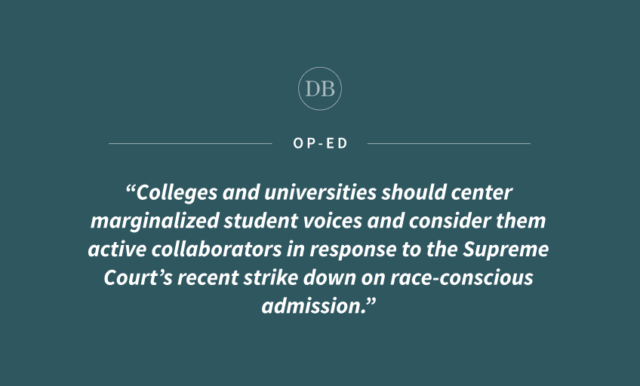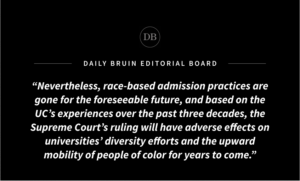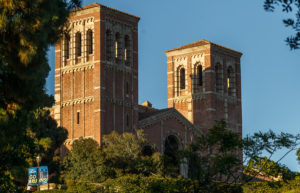This post was updated Aug. 27 at 7:31 p.m.
The University of California has long prided itself as a model collegiate system that reflects the state of California’s multiracial diversity and social progressivism. But while the nation is currently grappling with the removal of affirmative action, the UC system has witnessed the aftermath of a race-conscious affirmative action ban since 1996 when the California Civil Rights Initiative, commonly referred to as Proposition 209, was voted into law.
Proposition 209 immediately reduced the share of first-year Black and Hispanic students by approximately half at UCLA and UC Berkeley. A 2020 study concluded that Proposition 209 also led to a systemwide decline in the enrollment of underrepresented students and contributed to at least 10,000 of these students to trickle into lower-ranked universities. Economically, Proposition 209 also led to a decline in the total number of high-earning – earning more than $100,000 annually – Black Californians in their early 30s by at least 3%.
In a recent research project, I researched 10 Black UCLA alumni and their experience navigating the institution during Proposition 209’s formation and early stages of implementation. I discovered key findings about the ways in which students and administration alike responded to the passing of Proposition 209 – a significant event in these Black alumni’s college experience.
“Proposition 209 negatively affected the lives and trajectory of 30 years’ worth of Black Californians,” said a participant who will remain anonymous for confidentiality purposes.
Black alumni shared that reflecting on and celebrating Black UCLA history was a crucial part of adapting to a post-Proposition 209 world and an empowering tool to retain ownership of the institution. This knowledge was beneficial to Black students developing and maintaining a sense of belonging in universities that could often be exclusive and inhospitable to Black students. Participants also noted the complex nature of Black UCLA history, such as the murders of Bunchy Carter and John Huggins Jr. at Campbell Hall in 1969 and Black resistance against the UC system by pioneers such as Angela Davis.
Participants shared that they engaged with the UC Board of Regents and the administration but were often unaware of how those conversations affected the broader policy landscape. One student detailed his experience escorting Ward Connerly, a former UC Regent and chair of the Proposition 209 campaign, to campus in his role as a student leader prior to Proposition 209 being implemented.
“I brought him to campus and on the ride over here he asked me what my GPA was. If I had known now, I probably would have asked him why it mattered,” the participant said.
Another student leader frequently discussed his opinions about race and admissions with Connerly pre- and post-Proposition 209. These opportunities were valuable to the student as they were able to express the concerns and discontent of many campus affiliates about Proposition 209 to a key stakeholder and advocate of the proposition. Even though Connerly remained staunch in his support of Proposition 209, his interactions with student leaders were important for students and other advocates within administration, staff and faculty to voice their opinion and unity. It also allowed for collaborative efforts to combat Proposition 209 with admission policies such as holistic admissions, implemented in 2007.
Students played a central role in holding the administration accountable for addressing the harmful impacts of Proposition 209 for historically underrepresented groups. Following the passing and implementation of this proposition, various UCLA student organizations staged protests against this affirmative action ban, including one three-day protest called “Days of Defiance” in which 88 students were arrested. This significant event on UCLA’s campus saw multiracial coalition unity via the Movimiento Estudiantil Chicanx de Aztlán, Afrikan Student Union, Undergraduate Students Association Council, the Affirmative Action Coalition and many other groups came together in protest.
“We didn’t know what was going on. And we stood in defiance. It was a whole moment,” said a participant who was present at the Days of Defiance. “We’re standing on top of Royce, and there’s helicopters flashing lights on us, newscasters down there, all these folks cheering and, you know, rooting us on. And we’re just definitely not leaving until we get arrested one by one.”
The coverage of this incident made both local and national news, but it was just one of many protests that arose following the policy’s approval.
Colleges and universities should center marginalized student voices and consider them active collaborators in response to the Supreme Court’s recent strike down on race-conscious admission. These institutions should also be careful not to overinterpret rulings in their operations. For instance, various universities already began to hide information on applications about students’ racial identity altogether, even prior to the Supreme Court ruling. This type of overcorrection could harm the diverse representation of students on multiple campuses, and it is important for universities to engage with the student voice when planning the future of college admissions.
One student said, “We can tell you some of the problems, all you have to do is listen to us.”
Tim Herd is a third-year doctoral student at the UCLA School of Education and Information Studies in the Higher Education and Organizational Change Division.





Comments are closed.